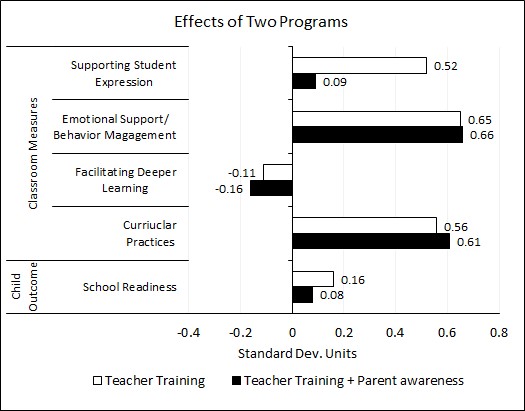Quality Preschool for Ghana Program Improves Teacher and Student Outcomes
Sharon Wolf, J. Lawrence Aber, Jere Behrman & Edward Tsinigo
Preschool teacher training program improves classroom quality and child outcomes in Ghana
Children around the world are attending preschool more than ever before. But many preschools are poor quality and children are not learning. Ghana, a lower-middle income country in West Africa, has been at the forefront of expanding access to preschool and adopting a progressive- child-centered curriculum.
Yet, preschool quality remains poor and most teachers have not been trained in the national curriculum.
In this study, we worked with Ghana’s Ministry of Education to develop and test the impact of a brief preschool teacher training and coaching program. We found that teachers trained in the program adopted more practices in the curriculum, provided more emotional support, and were more supportive of student expression. They also were less burnt out—a common problem among teachers that leads many to leave the profession—and consequently less likely to leave their job mid-year. Finally, the preschool students of trained teachers improved in their school readiness skills, including literacy, numeracy, and social-emotional skills.
Does engaging parents increase the programs’ effectiveness?
We know that parents play an important role in their children’s education. Along with the brief teacher training, some schools also received a program targeting parents’ awareness of child-centered learning and early child development. Unexpectedly, this program reduced the effectiveness of the teacher training. Teachers were less likely to adopt progressive teaching practices and children in these schools did not improve in any area of skill. It may be that parents pushed back on teachers and were against the school implementing the child-centered pedagogy.

How did we do this study?
We conducted an experimental study, which allowed us to estimate the causal impacts of the two programs. The preschools in the study were randomly chosen from 598 public and private preschools in the six study districts in the Greater Accra Region. These preschools were then randomly assigned—using a computer-based algorithm—to one of three groups: receive the teacher training program only, receive the teacher training program plus parental awareness program, and receive no program (also known as a “control group”). We were then able to compare the outcomes of the two intervention groups relative to the control group to understand how the programs changed teaching practices and child outcomes. The final sample included 240 schools, 444 teachers, and 3,435 students and their parents.
In subsequent studies, we have seen that some of the positive changes of the teacher training program on children have persisted up to two years later. Our results have informed Ghana’s Education Sector Planning as well as the curriculum reform for the preschool sector.
Full Article Citation:
Wolf, S.,Aber, J.L., Behrman, J.R., & †Tsinigo, E. (2019). Experimental impacts of the Quality Preschool for Ghana interventions on teacher professional well-being, classroom quality, and children’s school readiness. Journal of Research on Educational Effectiveness, 12(1), 10-37. https://doi.org/10.1080/19345747.2018.1517199
